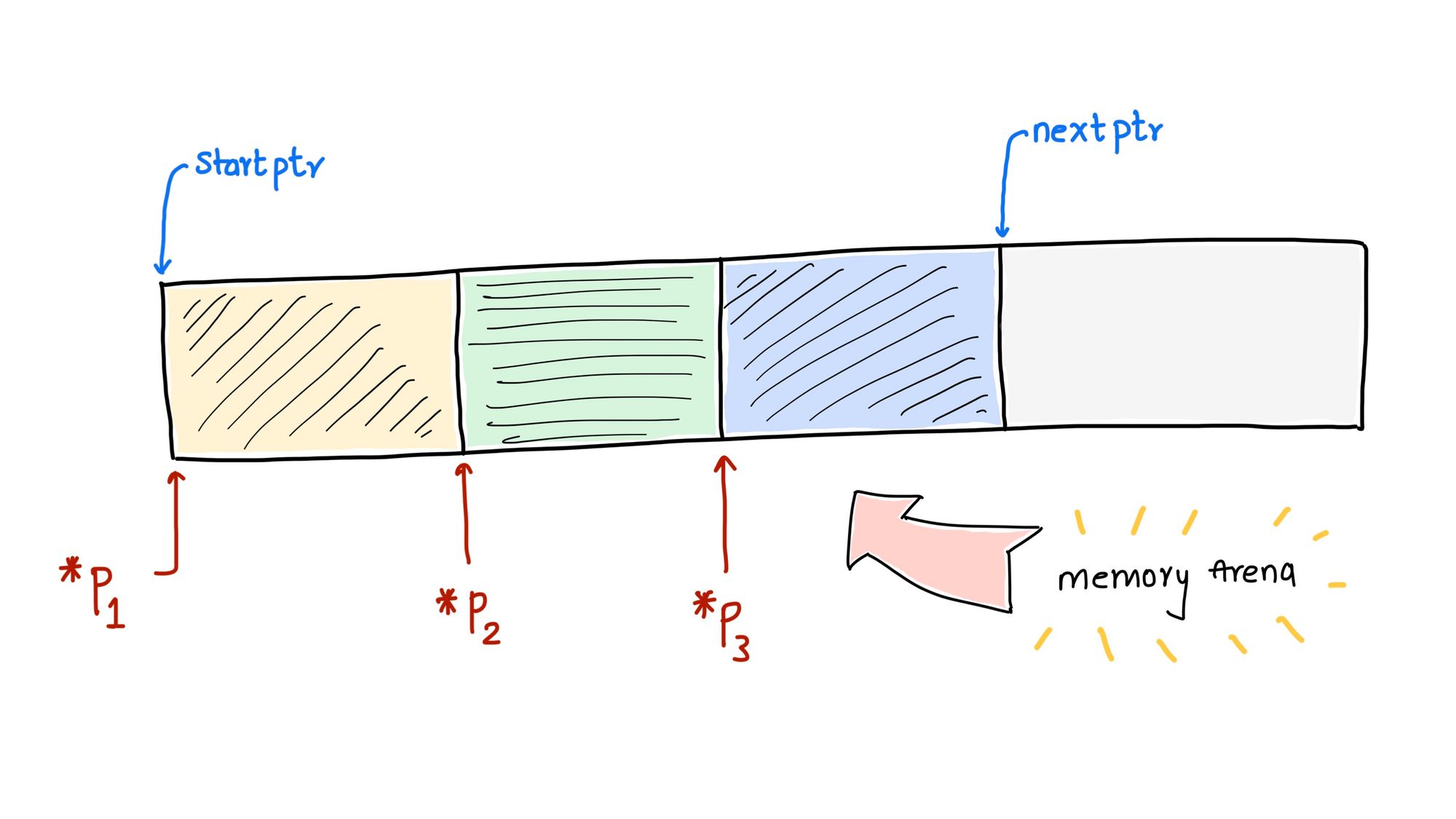Arena Allocator in C: A Fixed-Memory-Pool Approach
Arena allocation, a memory management technique, offers an efficient alternative to dynamic memory allocation.

Table of Contents
- Introduction
- The Fixed-Memory-Pool Arena Allocator
- Anatomy of the Arena Allocator
- Allocation and Management
- Implementation of an Arena Allocator
- Benefits and Use Cases
- Conclusion
1 - Introduction
Memory management is a fundamental aspect of software development, especially in resource-constrained environments like embedded systems. Arena allocation, a memory management technique, offers an efficient alternative to dynamic memory allocation. In this article, we delve deeper into arena allocation with a focus on the fixed-memory-pool approach, exploring its benefits, use cases, and implementation details.
2 - The Fixed-Memory-Pool Arena Allocator
At the core of arena allocation is the concept of a fixed-memory pool. Instead of relying on dynamic memory allocation, a predetermined, static memory pool is allocated. This pool remains constant throughout the application's lifetime, making it a valuable choice for scenarios where dynamic allocation is less efficient or not advisable.
3 - Anatomy of the Arena Allocator
The arena allocator comprises key components:
Memory Pool Size
The size of the memory pool is defined upfront, representing the total available memory for allocation. This static allocation ensures a predictable and constant memory footprint.
Arena Structure
Each arena is encapsulated within an Arena structure, which contains:
- Memory Pool: The actual memory pool (
data) where allocations occur. - Used Memory: The amount of memory used (
used) within the arena. - Next Arena: A pointer to the next arena in the list. This linked structure allows for seamless expansion of the allocator as needed.
4 - Allocation and Management
Initializing Arenas
The arena_create function initializes a new arena, setting the used memory to 0 and preparing it for allocation. Notably, this initialization does not involve dynamic memory allocation. Instead, the memory pool is allocated statically.
Allocating Memory
The arena_alloc function is responsible for allocating memory from an arena. It enforces the constraint that the requested memory size must not exceed the remaining space in the arena's memory pool. If sufficient space is available, a pointer to the allocated memory is returned. This process repeats until the arena is fully utilized, after which a new arena can be added.
Arena Reset
In practice, a complete arena allocator would implement the arena_reset function to clean up the arena when it's no longer needed. This might involve releasing the memory associated with the arena or resetting the used memory to 0 for reuse.
5 - Implementation of an arena allocator
Here's an implementation of an arena allocator in C . We will manage a fixed pool of memory, and allocation will be performed from this pool.
#include <stdio.h>
// Define the size of the memory pool
#define MEMORY_POOL_SIZE 4096
// Structure representing an arena
typedef struct Arena {
char data[MEMORY_POOL_SIZE];
size_t used;
struct Arena* next;
} Arena;
// Initialize a new arena
void arena_create(Arena* arena) {
arena->used = 0;
arena->next = NULL;
}
// Allocate memory from an arena
void* arena_alloc(Arena* arena, size_t size) {
// Ensure the requested size is not greater than the remaining space in the arena
if (size > MEMORY_POOL_SIZE - arena->used) {
return NULL;
}
// Allocate memory from the current arena
void* ptr = arena->data + arena->used;
arena->used += size;
return ptr;
}
// Free all memory allocated in an arena (not implemented in this example)
void arena_reset(Arena* arena) {
// This implementation assumes that memory is not explicitly freed,
// as arena allocation typically doesn't support individual deallocation.
// Instead, the entire arena is reset when it's no longer needed.
// You would need to implement memory management of arenas according to your needs.
}
int main() {
Arena my_arena;
arena_create(&my_arena);
int* int_ptr = (int*)arena_alloc(&my_arena, sizeof(int));
if (int_ptr) {
*int_ptr = 42;
printf("Value: %d\n", *int_ptr);
} else {
printf("Memory allocation failed.\n");
}
// Clean up the arena when done (not implemented in this example).
// You would need to implement memory management of arenas according to your needs.
return 0;
}
Explanation:
- We define the size of the memory pool, which is a fixed-size block of memory. This pool will be used for all memory allocations from the arena.
- We create a
struct Arenato represent an arena. It includes the memory pool (data), the amount of used memory (used), and a pointer to the next arena (if more arenas are allocated). - The
arena_createfunction initializes a new arena by setting the used memory to 0 and the next arena pointer toNULL. This function is now adapted to work with a pre-allocated memory pool. - The
arena_allocfunction is used to allocate memory from the arena. It checks if there is enough space in the current arena (within the memory pool) and, if so, allocates memory from it. It returns a pointer to the allocated memory. - The
arena_resetfunction is a placeholder for cleaning up the arena. In this simple example, we are not managing the memory deallocation of arenas. In a complete implementation, you would need to implement memory management of arenas according to your specific requirements.
6 - Benefits and Use Cases
The arena allocator with a fixed-memory-pool approach is particularly beneficial when:
- Efficient memory management is paramount, and dynamic allocation introduces unnecessary overhead.
- Memory fragmentation is a concern, and a contiguous memory allocation strategy is essential.
- Predictable and deterministic memory allocation and deallocation are required, making it suitable for real-time systems and embedded environments.
This technique finds application in various scenarios, including parsers, compilers, real-time systems, and embedded environments, where memory must be allocated and released efficiently without the risk of fragmentation.
7 - Conclusion
In conclusion, the arena allocator with a fixed-memory-pool approach offers an efficient alternative to dynamic memory allocation, enabling software developers to maximize memory utilization, reduce fragmentation, and meet the stringent demands of resource-constrained environments. Understanding and implementing this technique can greatly enhance memory management in applications where efficiency is crucial.

Discussion